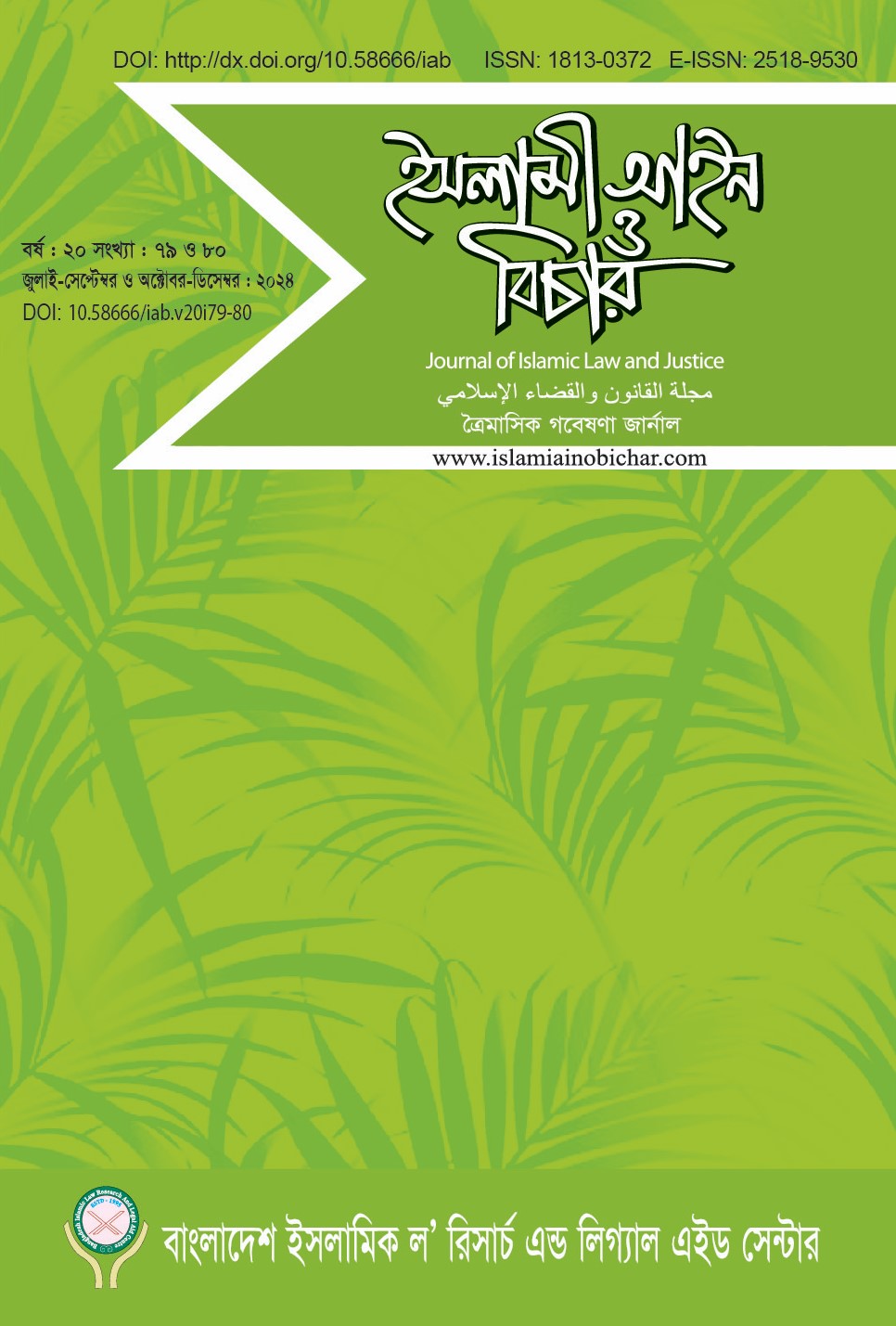খাদ্যে ভেজাল মিশ্রণে ক্রেতার আচরণগত ভূমিকা: ইসলামী দৃষ্টিকোণ |The Behavioral Role of the Buyer in the Adulteration of Food: An Islamic Perspective
DOI:
https://doi.org/10.58666/iab.v20i79-80.283Keywords:
Food, Adulteration, Consumer Rights, Buyer’s Behavior, Islamic Law, খাদ্য, ভেজাল, ভোক্তা অধিকার, ক্রেতার আচরণ , ইসলামী আইনAbstract
When the very term food adulteration is discussed, the face of the seller comes to our mind. However, the issue of food adulteration requires to be analyzed from a holistic perspective since we all of us, including buyers and sellers, are more or less involved in this process. This article has examined the responsibilities of the food buyer for purchasing adulterated food. This article has employed a qualitative research method. After collecting data from Rajshahi Metropolis and Puthia Upazila under Rajshahi district through interviews, the author has analyzed those. The results of the study have demonstrated that there is a lack of awareness among the food buyers regarding verification of BSTI logo, expiry date of food products, MRP, and collection of purchase receipts as well as filing complaints at the right place if they are defrauded.On the other hand, due to more interest in price than quality of the product, there is a tendency among buyers to bargain excessively as well as buying more food products than required during food crises. These issues inevitably affect food adulteration. In addition, it is found that a section of food buyers tends to request the food monitoring team to be more lenient on food adulterators which eventually assists in perpetuating adulteration. These negative trends can be overcome by increasing consumer awareness and religious-social responsibilities and rationalities. Although this study does not reveal the overall picture of food adulteration, it does reveal a true picture of the buyer’s thoughts and practices regarding food adulteration. Undoubtedly, the findings will play a vital role in facilitating the food-related researchers, students and policymakers to conduct further research.
সারসংক্ষেপ : খাদ্যে ভেজাল পরিভাষাটি আলোচিত হলে আমাদের মানসপটে বিক্রেতাদের চেহারা ফুটে উঠে। অথচ খাদ্যে ভেজাল একটি সামগ্রিক বিষয়, যেক্ষেত্রে ক্রেতা-বিক্রেতা, খাদ্য তদারকির সাথে সংশ্লিষ্টসহ আমরা সকলে কমবেশি জড়িত। বক্ষ্যমাণ প্রবন্ধে খাদ্যে ভেজাল প্রক্রিয়ায় খাদ্যক্রেতার দায় অনুসন্ধান করা হয়েছে। এ প্রবন্ধে গুণবাচক গবেষণা (qualitative research) পদ্ধতি ব্যবহৃত হয়েছে। রাজশাহী মহানগর ও রাজশাহী জেলাধীন পুঠিয়া উপজেলা থেকে সাক্ষাৎকার গ্রহণের মাধ্যমে তথ্য সংগ্রহ ও বিশ্লেষিত হয়েছে। গবেষণায় প্রাপ্ত ফলাফলে দেখা যায়, বিএসটিআই লোগো যাচাই, খাদ্যপণ্যের মেয়াদ যাচাই, এমআরপি যাচাই ও ক্রয় রসিদ সংগ্রহে এবং প্রতারিত হলে যথাস্থানে অভিযোগের বিষয়ে খাদ্যক্রেতার অসচেতনতা রয়েছে। অপরদিকে পণ্যের মানের চেয়ে মূল্যের দিকে অধিক আগ্রহের ফলে ক্রেতার অতিরিক্ত দরকষাকষি এবং খাদ্য সংকটের সময় প্রয়োজনের অতিরিক্ত খাদ্যপণ্য ক্রয়ের প্রবণতা রয়েছে। যা খাদ্যে ভেজালকে প্রভাবিত করে। এছাড়া খাদ্যক্রেতার একাংশ খাদ্যে ভেজালকারীদের পক্ষে তদারকি টিমের নিকট সুপারিশের প্রবণতাও লক্ষণীয়, যা ভেজাল টিকে থাকতে সহযোগিতা করে। ভোক্তার সচেতনতা বৃদ্ধি এবং ধর্মীয়-সামাজিক দায়বদ্ধতা ও যুক্তিশীলতার চর্চা বৃদ্ধি করে এসকল নেতিবাচক প্রবণতা থেকে মুক্তি পাওয়া যেতে পারে। এ গবেষণায় খাদ্যে ভেজাল সম্পর্কে ক্রেতার চিন্তার প্রতিফলন ও অনুশীলনের বাস্তব একটি চিত্র ফুটে উঠেছে যা খাদ্য সংশ্লিষ্ট গবেষক, শিক্ষার্থী ও নীতি নির্ধারকদের ক্ষেত্রে সহায়ক ভূমিকা পালন করবে।
References
al-Qur᾿ān al-Karīm
Abū Dāwūd, Sulaimān Ibn al-Ashʻath. 1999. Sunan Abī Dāwūd. Riyad: Dār al-Salām.
Al Maruf, Md. Hasan. Assistant Director, the Directorate of National Consumers’ Rights Protection. Divisional office, Rajshahi. Interview date: 03 November 2022.
al-Baihaqī, Abū Bakr Aḥmad b. al-Ḥusain b. ʻAlī b. Mūsā. 2003. al-Sunan al-Kubrā. Edited by: Muḥammad ʻAbd al-Qādir ʻAatā. Beirut: Dār al-Kutub al-ʻIlmiyyah
al-Bukhārī, Abū ʻAbd Allāh Muḥammad Ibn Imāʻīl. 2002. Saḥīḥ al-Bukhārī. Beirut: Dār Ibn Kathīr.
Ali, Md. Zafar. 2022.ʻʻUttpadito Khaddoponne Vejal Protirodhe Rasulullah (PBUH) er Nirdeshona᾿᾿ Islami Ain O Bichar Vol. 18, Issue: 69 & 70, 27-52.
al-Zuḥailī, Wahaba Ibn Muṣtafā. al-Fiqh al-Islāmī Wa Adillahtuh. Dimashq: Dār al-Fikr.
Arefin, Aishawarya, Paroma Arefin, Md. Shehan Habib, and Md. Saidul Arefin. 2020. “Study on Awareness About Food Adulteration and Consumer Rights Among Consumers in Dhaka, Bangladesh.” Journal of Health Science Research 5 (2): 69–76. https://doi.org/10.18311/jhsr/2020/25038.
Bhatt, Shuchi Rai. 2010. “Impact Analysis of Food Adulteration on Health in Some Selected Urban Areas of Varanasi”. PhD diss. V. B. S Purvanchal University, India.
Choudhary, Ankita, Neeraj Gupta, Fozia Hameed, and Skarma Choton. 2020. “An Overview of Food Adulteration: Concept, Sources, Impact, Challenges and Detection.” International Journal of Chemical Studies 8 (1): 2564–73. https://doi.org/10.22271/chemi.2020.v8.i1am.8655.
Hasan, Mehedi. 2022. ʻ‘Bangladeshe Vokta Odhikar Songrakkhane Islami Kroy-Bikroy Poddhoti’’. PhD diss.Institute of Bangladesh Studies (IBS), University of Rajshahi.
Ibn Kathir, Abul Fida Ismail Ibn Umar. 2000. Tafsirul Kuranul Azim. Byrut: Daru Ibn Hizam.
Islam, Amirul. 2024. Islamic Principles To Prevent Food Adulteration And Practices In Bangladesh. MPhil Thesis. Institute of Bangladesh Studies (IBS), University of Rajshahi.
Islam, Md. Nazrul. 2018. Islame Vokta Odhikar. Dhaka: Islamic Foundation Bangladesh.
Islam, Md. Shofiqul. 2019. “Ponne Vejal Protirodhe Islam: Poriprekkhit Bangladesh’’ (Preventing Adulteration of Commodities in Islam Bangladesh Perspective) Islami Ain O Bichar 15:58, 109-136.
Islam, Md. Shohidul. 2023. Sanitary Inspector, Civil Surgeon Office, Rajshahi. Interview date: 25 September 2023.
Khan, Akbor Ali. 2017. Porarthoporotar Orthoniiti. Dhaka: The University Press Limited.
Mohamad, Omar Abu Al-Majd. 2022. ʻʻIslamic Literature Examining Food Fraud Regulations from A Systematic Review Approach.’’ American Journal of Science Education Research, American J Sci Edu Re: AJSER-101. Doi: 10.47378/AJSER/2022.100104 .
Muslim, Abū al-Ḥusaīn Muslim Ibn Ḥajjāj. 2000. Saḥīḥ Muslim. Riyād: Dār al-Salām.
Nasrin, Lubna. 2006. ÔÔConsumer Rights in Bangladesh: Legal Status and Protection Modalities” PhD diss., Institute of Bangladesh Studies, University of Rajshahi.
Rahman, Md. Arifur, Md. Zakir Sultan, Mohammad Sharifur Rahman, and Mohammad A. Rashid. 2015`` Food Adulteration: A Serious Public Health Concern in Bangladesh’’ Bangladesh Pharmaceutical Journal 18(1): 1-7 accessed date: 13.05.2023 https://www.banglajol.info/index.php/BPJ/article/view/23503
Rahman, Shahnur. 2014. Nirapad Khaddo Nishchitkoron: Sushasoner Challenge o Uttoroner Upay. Dhaka: Transparency International Bangladesh (TIB)
Sutherland, Edwin H. 1940. “White-Collar Criminality.” American Sociological Review 5 (1): 1-12. https://doi.org/10.2307/2083937.
Downloads
Published
Issue
Section
License
Copyright (c) 2025 AMIRUL ISLAM

This work is licensed under a Creative Commons Attribution 4.0 International License.





